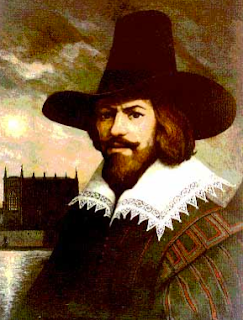Remember, remember
 |
| Guy Fawkes in the late 1500's |
Today is the fifth of November.
Maybe you’ve seen people post on social media about watching V for Vendetta or
a poem from the film, “remember, remember the fifth of November; gunpowder
treason and plot, I see no reason why gunpowder treason should ever be forgot.” The fifth of November is remembered historically because of
Guy Fawkes (1570-1606.)
In 1604 Guy
Fawkes and a group of English Catholics were involved in a plot against King
James, a protestant. The plan was to kill the King and his government by
blowing up Parliament with gunpowder. The plotters initially bought 20 barrels
of gunpowder and then 16 more, which were stored in a rented room owned by the
Keeper of the King’s Wardrobe. Due to the threat of contraction of the plague,
the opening of Parliament was continually rescheduled, until it was finally
moved to November 5, 1605.
The
conspirators were discovered because of warning letter that was sent to a
fellow Catholic, warning him of the blast and telling him to stay away from
Parliament on the fifth. The letter roused suspicion and was passed along to
King James. The cellars under Parliament were searched and Fawkes was found
exiting the building and arrested. After torture and confession Fawkes and his
cohorts were hanged and quartered.
 |
| The mask of V from V for Vendetta, is designed to look like Guy Fawkes, drawing parallels to Fawkes' anti-government agenda |
On November
5 Londoners were encouraged to celebrate the King’s escape from death. The day
of celebration was actually law via an act of Parliament until 1859. Bonfires
and fireworks have been included in celebrations for centuries. Effigies of Guy
Fawkes are commonly placed on the fires. I’ve actually been to a Guy Fawkes Night.
We built a large bonfire, probably the biggest one I’ve seen in person, and
threw a scarecrow-type dummy on top.
Despite
being convicted of high treason, because of some historical romance novels and
children’s books, Guy Fawkes is remembered as a sort of hero. He is frequently
referred to as “the last man to enter Parliament with honest intentions.”
Comments
Post a Comment